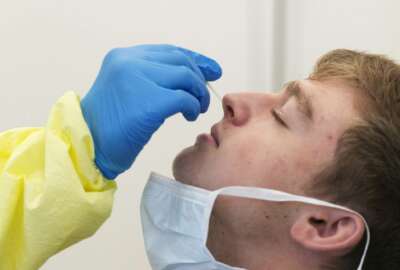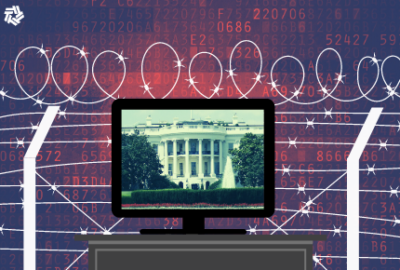
Hubbard Radio Washington DC, LLC. All rights reserved. This website is not intended for users located within the European Economic Area.
Hubbard Radio Washington DC, LLC. All rights reserved. This website is not intended for users located within the European Economic Area.
As Congress debates, to put it politely, what if anything should be in a next pandemic relief legislation, some members are starting to ask if they and their st...
Best listening experience is on Chrome, Firefox or Safari. Subscribe to Federal Drive’s daily audio interviews on Apple Podcasts or PodcastOne.
As Congress debates, to put it politely, what if anything should be in a next pandemic relief legislation, some members are starting to ask if they and their staffs ought to be tested for the pesky germ. With our weekly congressional outlook, WTOP Capitol Hill correspondent Mitchell Miller joined Federal Drive with Tom Temin.
Interview transcript:
Tom Temin: Mitchell, let’s talk with the big picture here first, they seem to be miles apart.
Mitchell Miller: Yeah, this is a situation where normally we’re used to Congress always running it right up to the absolute last second deadline, getting their backs totally against the wall, and then somehow, someway they are able to work it out. So what’s happened this time? Why is this dynamic so different? It’s because they’re coming from such completely different positions. I mean, the House Democrats have been saying this for months now that they passed the HEROES Act, but it was more than $3 trillion. And Republicans from the get go and frankly, some Democrats even acknowledged that that wasn’t going to be a starter related to negotiations really from the GOP side. The GOP, of course, came back with Senate Majority Leader, literally $2 trillion apart with a $1 trillion proposal, and they have never really been able to bridge that gap. Sure they’ve made a lot of progress on a variety of different topics but they are so fundamentally different. As House Speaker Nancy Pelosi has said, it’s in her view, it’s a matter of values. Republicans look at the Democrats and say they’re throwing everything but the kitchen sink in their proposal. So they have come at this at from such different positions, even though they’re always obviously antagonistic this is just a fundamentally different situation I think.
Tom Temin: What does that mean for everything else legislatively on the agenda? Or can they maybe put this aside and go on with what else they were thinking about?
Mitchell Miller: Well, I think what they may have to do is actually push this ahead and get it back into what would normally be the process for actually approving a lot of the bills and everything. Of course the House is already approved it’s appropriations measures, but at some point the Senate is going to have to do the same thing. So whether they take a big long breather here or whether they jump right back in, they are going to have to tackle a lot of these issues. And obviously, the issue of unemployment and unemployment insurance is not going to go away. The issue of people possibly being forced out of their homes on the rental agreement is not going to go away. The White House obviously doing a lot of different things to try to address that as well. So I think they’re still going to have to deal with these individual issues as they move forward.
Tom Temin: And they’re also talking about having members of Congress and their staffs tested for the coronavirus in the midst of all of this.
Mitchell Miller: Right and this was really kicked back into gear by Texas Congressman Louie Gohmert when he announced through the testing at the White House actually that he had come up with the virus, and then we’ve had two other lawmakers since then, and really a lot of people don’t know this, but there have been close to 100 people on Capitol Hill if you count not only lawmakers but staff members, people working here up on the Hill who have either tested for the virus or they were thought to actually have had the virus and had to quarantine for at least several days or perhaps two weeks. So there’s really been a fundamental change here at least from some of the leaders on the Democratic side, House Speaker Nancy Pelosi, as well as Senate Majority Leader Mitch McConnell, over the last several months have said no, we don’t want the testing to occur. There was a high sensitivity especially because there wasn’t a lot of testing early on, that lawmakers would get special treatment and the rest of the public would not get that However, with the incidents that I just mentioned, and then also with the fact that House Majority Leader Steny Hoyer came out last week and said he really wants to look at testing, that really changes things here. Republicans for months have actually been calling for testing. House Minority Leader Kevin McCarthy has said there’s no reason that testing couldn’t happen. Of course the White House early on said they would have quick rapid testing that they could offer lawmakers, and of course we saw last week, however, that that rapid test can have a problem too, because Ohio Governor DeWine, they thought he was positive and then it turned out it was negative. So a lot of complicated issues here related to the testing and is it going to just be lawmakers — or as Republicans want they want not only lawmakers but members of staff, many of them of course are still working at home, but there are staff people up here on the Hill, and then reporters as well being tested, because you have, as they say, a big campus of people here coming in and out and especially because they’re going back and forth across the country.
Tom Temin: And also on the Congressional agenda, the Postal Service.
Mitchell Miller: Postal Service has been in the thick of it because of course the mail and voting issue, which President Trump has said a lot about, and Postmaster General Louis Dejoy has been under a lot of pressure. He put into place some elimination of overtime for hundreds of thousands of postal workers, members of both parties concerned about delays in the mail, especially since the number of ballots sent this year is going to be up exponentially due to the pandemic. Senate Minority Leader Schumer and House Speaker Pelosi met with Dejoy last week. They outline their concern and what was described as a very heated meeting. House lawmakers want to include $25 billion in the pandemic bill to try to get more resources for the Postal Service. On the Senate side, Gary Peters of Michigan has pushed for more details related to the delays. And the House Oversight Committee is calling for Dejoy to testify before the panel next week. Dejoy late last week denied that the Postal Service has done anything to slow down mail service. But this is an issue that certainly is not going to go away as we get closer to election day.
Tom Temin: And looks like Congress is getting involved in the telework expansion that has occurred and maybe they want it to continue after the pandemic is over, loosen up the policies there as they look at EPA struggles to get people to back into the offices at that agency.
Mitchell Miller: Right. There’s a big push among Senate Democrats particularly about getting a lot of the telework back online and Maryland Senator Chris Van Hollen is among those that’s leading that push. They wrote another letter to OPM and really want to get these agencies to make sure that they are giving all the people that are working in the federal government, enough ability to continue to telework. A lot of the federal unions, as you know, have been complaining that they think that some of the agencies, particularly the EPA may be moving ahead too quickly. Last week, there was a reopening in Washington with the offices here, there’s been offices reopened in New England. And basically the unions are saying that during this phase two of the reopening that EPA is not following its own guidelines that some of the metrics haven’t gotten down to the low enough point where people can actually return to their offices. EPA has pushed back on that and said that the unions have done some things that they don’t like. But clearly there’s a continuing struggle here. And we are in August, a lot of federal officials, I think, thought that many of these issues would sort of be resolved as things kind of tamp down but because there’s been so many spikes related to COVID-19, these issues keep percolating from time to time.
Tom Temin: Mitchell Miller is Capitol Hill correspondent for WTOP. Thanks so much.
Mitchell Miller: You bet
Tom Temin: And you be safe up there too.
Mitchell Miller: I’ll try.
Copyright © 2024 Federal News Network. All rights reserved. This website is not intended for users located within the European Economic Area.
Tom Temin is host of the Federal Drive and has been providing insight on federal technology and management issues for more than 30 years.
Follow @tteminWFED

